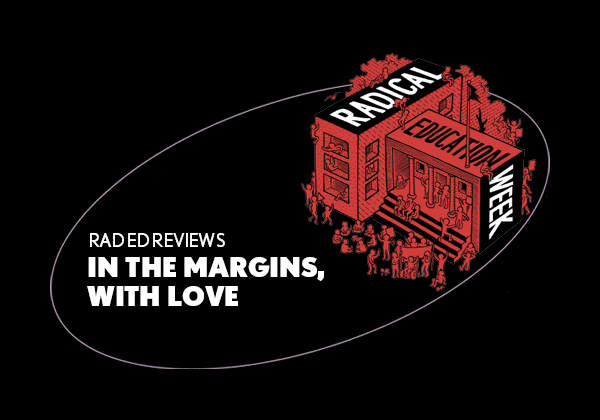On the last day of the SRC elections, feeling burnt out by the endless barrage of snarky subtweets and cutthroat comment sections, myself and a few others found a much needed breath of fresh air and reminder of what politics guided by compassion could be in the Rad Ed workshop ‘In the Margins, with Love: Homework with Snack Syndicate’.
Atomised by our Zoom windows, but with many lounging outdoors soaking up the sunlight, we came together to listen to SRC Women’s Officer Amelia Mertha speak with critical art collective Snack Syndicate (Astrid Lorange and Andrew Brooks) about their book Homework. Mertha described the essay collection as “radical education manifest…It looks beyond the sandstone and gyprock walls of the university institution and finds rebellious, curious, feeling students everywhere in all of us who imagine collective liberation.”
Snack Syndicate are, as they said in the workshop, indebted to the notion of study that emerged from the Black radical tradition, notably Fred Moten and Stefano Harney’s The Undercommons: Fugitive Planning & Black Study, where study is “a social practice that’s inextricably connected to social contexts.” Brooks sees the potential of study as “something that brings us together against the various things in this world that would emphasise individuation” including formal learning settings.
The metrics, marks and credentials that define our schooling lives, they suggest, orient us toward the competitiveness of capitalist society, rather than collective understanding.
For Lorange, a key distinction between study and learning is the absence of a definite object of knowledge: “Study is the extension of learning into every aspect of daily life.” This notion of study as a lifetime commitment removes the endpoint from learning. Study is attention, understanding, allowing each other to transform and to be transformative, constantly shifting, entering and re-entering texts… Love is a form of study.
Moving on to a discussion of citation — an activity which is frequently treated as a last-minute chore among students everywhere — Lorange reminded us that it is in fact a political gesture. The choice of inclusion and exclusion in our citations is a tool of power. Citation can be something generative; it makes a claim to the landscape of ideas you inhabit, and has the potential to rupture practices that legitimise the canon. “By being attentive to who we read, and how we invite them into the space of our thinking, and writing, we’re doing the important work of producing alternative histories of reading, of thought, and of solidarity.”
Like study, citation can present a way of thinking of the text as a collective product through which love moves.
The workshop also touched upon how art emerges from contact with struggle: “Maybe we can think of the artwork as the gift that struggle gives…It might produce an artwork or it might produce a riot,” Brooks said.
Moreover, Lorange suggested how studying art can put us in the practise of reflexive attentiveness — a certain clear-eyedness — to the material factors of how things are made: “If we take that mode of attention to other things like law, history, public health announcements, advertising and university emails, we are in a better position to understand the particular conditions in which those discursive acts come into being and make a kind of claim to truth or reality.”
When asked how they negotiate the tension between being communists and abolitionists with the reality of the university institution, Brooks admitted “it’s difficult, maybe near impossible to escape contact with institutionality,” though emphasised that working in the university isn’t inevitable.
“There are all sorts of things that are complicated and fraught about the institutions that we’re a part of. Not least is the way that they are extractive and the way they are governed by a logic of capitalism…It’s true to say that it’s a contradiction to both desire the abolition of capital relations, of the settler colony, of borders, of the prison, and to draw a wage from an institution that reproduces much of that logic. And yet, in some ways, to focus or dwell on that question, prevents one from doing the work of thinking about how we move towards abolition.”
Ultimately for Snack Syndicate, we can acknowledge our ambivalent relationship with the institutions we’re implicated in, while creating spaces of community and love that allow us to conceptualise different horizons.
Perhaps the homework we must take into the rest of our lives is to write a plan for this future — in the margins — together.





